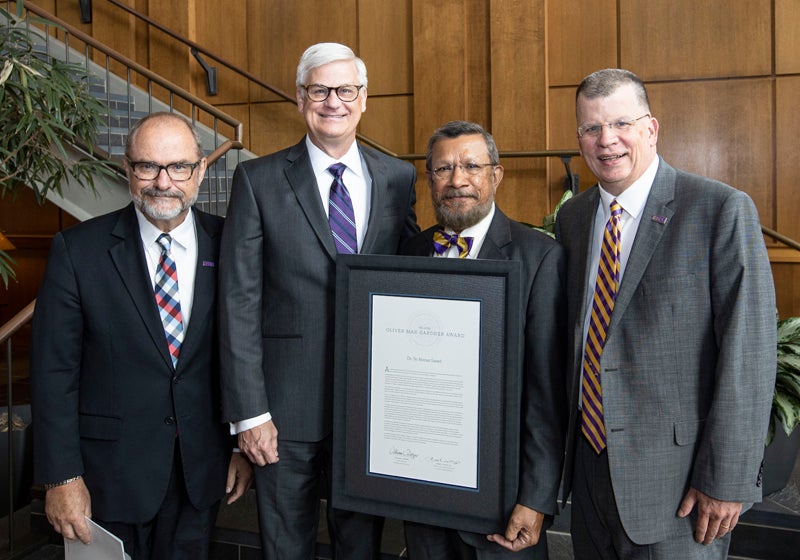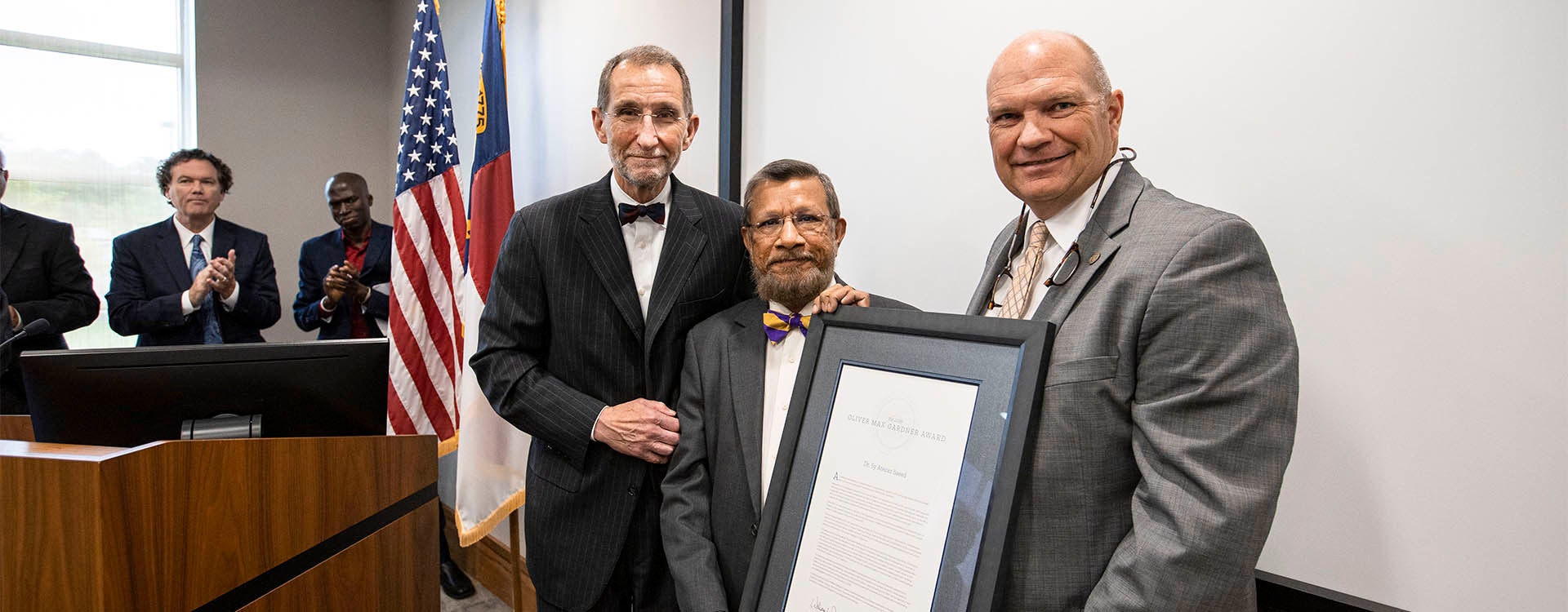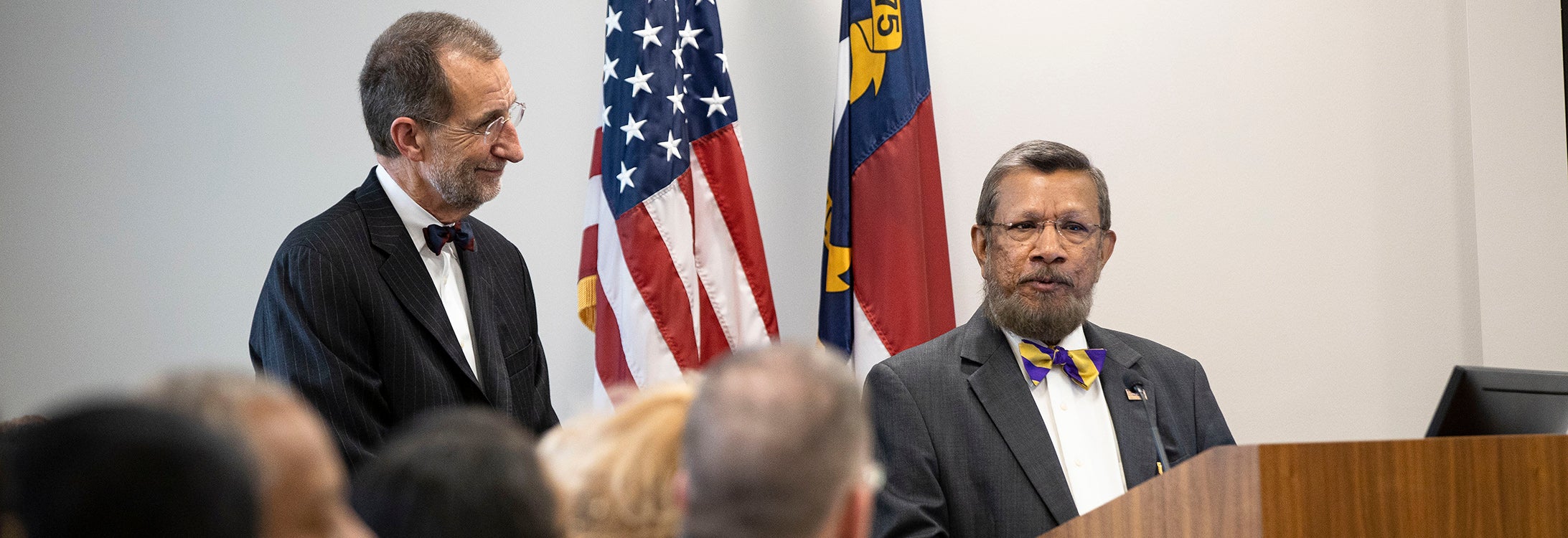HIGHEST FACULTY HONOR
Saeed receives UNC System’s Gardner Award
CHAPEL HILL — A Brody School of Medicine psychiatrist has joined a prestigious group of East Carolina University professors bestowed with the UNC System’s highest faculty honor.
Dr. Sy Saeed, professor and chair of the Department of Psychiatry and Behavioral Medicine, was named the 2019 recipient of the O. Max Gardner Award on Wednesday at the Board of Governors’ monthly meeting in Chapel Hill. The honor pays tribute to one faculty member within the UNC System who, during the current academic year, made the greatest contribution to the welfare of the human race.
“From the classroom to the clinic, you are improving the lives of countless individuals with your creative approach to mental health care,” said UNC System Interim President Bill Roper. “We are indebted to you for your contributions to the welfare of the human race. Your contributions to telemedicine are not only changing the lives of North Carolinians; your research and public policy efforts are benefitting the entire nation.”
After receiving a standing ovation from the Board of Governors, audience and his family and colleagues, Saeed expressed his appreciation to his ECU team for inspiring his work and motivating him to be a better mental health care professional.
“Dr. Saeed represents the best of what the Brody School of Medicine was set up to do,” said ECU Interim Chancellor Dan Gerlach. “It was set up for people who have academic excellence, who have the creativity and the passion to serve people who need it the most, and to create new things – like telepsychiatry – that some people never thought possible to help make a difference in the lives of North Carolinians. It’s a great tribute to his life’s work and a great tribute to the type of people we attract to ECU.”
An open door for the underserved
Not long ago, Saeed received a handwritten note from a woman halfway across the country who had read an article about him in her local newspaper.
The Associated Press article reported how telepsychiatry—the use of secure, real-time interactive audio and video technology at the bedside to connect patients with expert psychiatric assessments and mental health care—is helping combat the shortage and maldistribution of psychiatrists. The article struck a chord with the woman, who wrote that her daughter had faced mental health challenges and that Saeed’s work is a step in the right direction of reaching every patient who needs treatment for mental disorders.
That direction is being charted at ECU, with Saeed at the forefront. He helped develop the North Carolina Statewide Telepsychiatry Program (NC-STeP) and serves as director of both that program and the ECU Center for Telepsychiatry and E-Behavioral Health (CTeBH). Much of his work focuses on using telepsychiatry to provide mental health care in remote and underserved areas where psychiatric services are scarce.
“He’s done things that people thought would be impossible,” said Dr. Mark Stacy, dean of Brody and vice chancellor for ECU’s Division of Health Sciences. “Telepsychiatry; people probably thought his idea was impossible and now it’s in 60 hospitals in the state.”
Established through state legislation in 2013 with $2 million in annual funding, NC-STeP is administered by the ECU CTeBH and is overseen by the Department of Health and Human Services’ Office of Rural Health.
More than 55% of North Carolina’s hospitals are set up for telepsychiatry. More than 33,000 psychiatry assessments have been completed since the program’s inception, resulting in more than 4,300 involuntary commitments overturned. This has saved the state in excess of $23 million by preventing unnecessary hospitalizations and delivering much-needed care to patients previously untreated. It’s estimated that at least 32% of telepsychiatry patients in the state would not have received treatment without the program.
“Telepsychiatry fills gaps with what science has promised these patients,” Saeed said. “They now have emergency intervention and access to professional medical care. We’ve opened a door.”
‘Quality care close to home’
The domino effect of telepsychiatry impacts patients, their families and entire communities—changing the lives of thousands across North Carolina.
“Dr. Saeed serves as a champion for those facing problems associated with mental health, especially those in underserved areas,” said Dr. Ron Mitchelson, ECU provost and senior vice chancellor for academic affairs. “Dr. Saeed has improved the lives of countless North Carolinians with his creative approach to mental health care.”
For patients, that approach allows them to finally be heard—and receive access to expert treatment right where they are. For many, the only place to turn is their hospital emergency department, where they often wait days for the appropriate evaluations.
“Dr. Saeed’s initiative addresses the need to provide timely acute care services to emergency departments throughout the state,” said Dr. Marvin Swartz, professor and head of the Division of Social and Community Psychiatry in Duke University’s School of Medicine. “The emergency departments are struggling mightily to address the rising number of patients requiring behavioral health evaluations.”
Not only are North Carolina’s hospitals embracing telepsychiatry as a way to ease that stress; other states are eyeing ECU’s model – a trend that stands to change the future of mental health care across the state and beyond.
Local health departments are jumping on board, too. Battle Betts Jr. is health director at Albemarle Regional Health Services in Elizabeth City, the first local health department to pilot the NC-STeP program.
“Based on the success of the initial NC-STeP program, it was a natural progression to expand the program into local health departments,” Betts said. “Since 2016 when we first ventured into this arena, over 80 different area providers have referred their patients to us for care. Behavioral health needs continue to rise in today’s society, and Dr. Saeed’s innovative vision has made great progress toward seeing that all residents of our state have access to quality care close to home.”
Bridging the mental health care gap

(From left) ECU Provost Ron Mitchelson, Vice Chancellor for Health Sciences Mark Stacy and Interim Chancellor Dan Gerlach (right) congratulate Dr. Sy Saeed on being named the 2019 recipient of the O. Max Gardner award.
When a patient requiring a telepsychiatry consult presents at a remote referring site, a nurse rolls a portable cart equipped with a monitor, camera and microphone into the patient’s treatment bay or room, establishes a secure connection to the psychiatric provider site and introduces the patient to a psychologist or social worker who has reviewed the patient’s case. Once the patient’s situation is assessed and relevant information gathered from family members, a psychiatrist evaluates the patient and makes recommendations to the referring hospital physician, who is ultimately responsible for care decisions.
From the earliest days of his career, Saeed learned to anticipate and believe in the impact of such a medical innovation before it even existed. As a young physician, he was driven to pursue a career that not only helped heal patients, but also encouraged communities to flourish. In Pakistan, Saeed completed his medical training and was offered a position as chief medical officer at a federal medical center in a remote province. He traveled to the site, eagerly awaiting the chance to connect with patients and offer solutions for health and wellness. Instead, Saeed found that the federal medical center did not exist yet—he had been called to treat the region’s people before the clinic was even built.
“I thought, ‘I’m here to serve people,’” Saeed says. “I convinced my boss to give me a temporary place (until the center was built) where I could start a clinic where people who needed care could go. That’s what led to my administrative leadership type of thinking, on how you even start these things. The need was so dire.”
It is this kind of thinking that has driven Saeed, since joining ECU in 2004, to again push for change that could improve millions of lives. The statistics are still glaring: more than 30 North Carolina counties—about one-third—have no practicing psychiatrist; most of those counties are in the East. Saeed knew early on from experience that his work at ECU would be two-fold: to provide the state’s residents the services that were in essence promised to them as North Carolinians, and to help people in communities who were falling victim to the mental health care gap.
“It’s no longer just a gap,” Saeed said. “It’s a chasm.”
A promise to serve
Dr. Saeed’s mission to assist patients across North Carolina goes hand in hand with ECU’s motto, Servire, “To Serve.” First interested in pathology, family medicine was where he gravitated because of the patient-family-community connection. A natural inclination toward mental health followed. Now, Saeed continues to pursue more improvements in mental health care treatment as research and evidence-based care evolve. He believes professionals have a duty to be pioneers.
“We have an obligation to stand on the shoulders of those who came before us and leave things better than how we found them,” he said. “We have a responsibility to be good stewards of resources and good stewards of knowledge.”
Saeed has received numerous author recognition awards, is editor-in-chief of a scholarly journal and on the editorial board of many others, and holds an array of leadership and administrative roles. He has authored nearly 100 scholarly papers.
The O. Max Gardner Award was created in 1949 through the will of Oliver Max Gardner, the late senator, lieutenant governor and governor of North Carolina. Nominations are open to all of the UNC System’s institutions.
Saeed is the ninth ECU professor to earn the O. Max Gardner Award. Dr. Sam Sears won the 2013 award for his world-renowned work in cardiac psychology. They join Dr. W. Randolph Chitwood Jr., the 2004 honoree for minimally invasive cardiothoracic surgery and Dr. Walter J. Pories, named for his biochemistry advances in 2001.
Other past ECU recipients are William E. Laupus, 1989, medicine; Edgar Loessin, 1986, theater; Stanley R. Riggs, 1983, geology; Francis Speight, 1975, art; and Ovid Williams Pierce, 1973, literature.

Sy Saeed accepts the O. Max Garner award from UNC System Interim President Bill Roper and UNC Board of Governors Chair Harry Smith.
